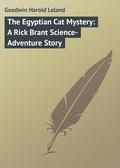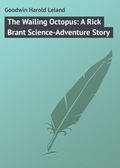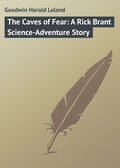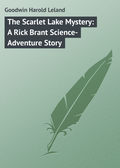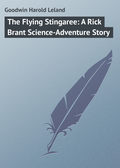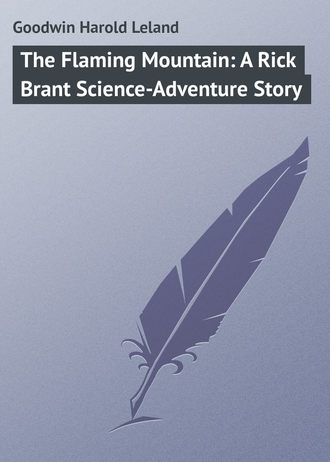
Goodwin Harold Leland
The Flaming Mountain: A Rick Brant Science-Adventure Story
Military trucks were lined up, apparently waiting to be loaded with the blue earth.
"Where are they taking it?" the governor wondered.
Rick had talked with David Riddle about the process. "They need water. The blue earth is run down long wooden tables with cleats on them, like washing out gold. The table is coated with grease. The diamonds stick in the grease and the blue earth washes away. They've probably set things up at the pumice works if there's water there. Otherwise, it may be the hotel."
"It has to be the hotel, then," the governor explained. "There would not be enough water at the pumice plant. Well, I think we have found all our troops. Those who are not with the three companies are below us, digging diamonds. I wonder if they know what they are digging?"
Rick told the governor what Scotty had said.
"That is probably right," the governor agreed. "Guevara would not dare to let too many in on the secret. Well, shall we get to work?"
"Yes, sir," Rick said. He handed the governor the microphone and swung into position for a run over the troops on the road. He throttled down, and then gave the plane a few degrees of flaps. He kept an eye on his air-speed indicator. If he got too slow, the plane would stall and he'd be too low to recover. "I'll make as tight a circle as I can," he said. "Be ready."
The troops came into sight. Rick lost altitude and began a slow circle only a few hundred feet over the marching soldiers. He turned on the switches and nodded.
The governor began to talk in slow, clear Spanish. Rick understood that he identified himself to the men below, but then he lost the trend of the talk. He concentrated on flying. The loud-speakers were operating perfectly, and he knew the troops could hear.
He could see them looking up and pointing, but they kept marching. Apparently the governor wasn't making much of an impact. The governor paused, and Rick cut the switches.
"Maybe they don't believe it's you," he suggested.
"Perhaps not. But my voice is well known. I speak over the radio at least once a week. More likely the whole idea is just too much for them. Who can believe that mountain over there is about to blow up?"
"Let's try the troops at the pumice works. Maybe you can tell them that all who care about their homeland should march at once to Calor."
"I'll try it," the governor agreed.
Rick circled low over the pumice works while the loud-speakers blasted at the troops below. They watched the plane, they pointed, some ran out for a better look. But when the governor pleaded with them to hurry to Calor to help save the people of the island, nothing happened.
"If El Viejo started smoking, they'd move fast enough," Rick said bitterly. "But then it would be too late. They just don't believe there is any danger, and maybe they're not sure it's you. I guess no one has ever given them orders from the air before."
"They are simple people," the governor agreed. "I think most of them have never heard of a volcano. They don't even know what an eruption is. How can they be excited? If I ever succeed in getting good schools here, this may change. But it won't help us now."
Rick considered. It would do little good to repeat the announcement to the soldiers at the hotel. He wondered if Guevara and Connel were somewhere below, and with that thought he turned toward the diamond pipe.
"Let's see if we can do any good with the truckmen," he suggested. "Tell them the trucks are essential to the safety of their families."
The governor tried, while Rick held the plane in in a tight circle over the blue ground. Again, there was interest in the flying loud-speaker plane itself, but the message made no impact. Then Rick noticed tiny spurts of fire from one edge of the diamond field and cold sweat started on his forehead as he suddenly realized what they were.
"They're shooting at us!" he exclaimed, and gave the plane the gun, taking evasive action as the distance widened.
"I saw," the governor said wearily. "It was not the troops. It was the peons. Our friend Guevara is down there, I think. But he need not be afraid of our effect. We have had none."
Rick had seldom felt so frustrated. He was tempted to call the San Luzians a stupid bunch of cattle, but he realized the governor had stated the case accurately. They just didn't understand the danger. What would they understand?
His lips formed the word. "Diamonds!" At least they would understand treasure.
"Sir," he said excitedly, "we can break this up, at least enough so we can start collecting data again. If we tell them the whole story, they'll at least understand that Guevara is after great treasure. They'll flock to the diamond field and disrupt the operation, and we can move back in to some of the shot stations. The people won't be any worse off than they are now, and it will give us a chance to do something!"
The governor considered. "Perhaps that is the only solution. It will not get my people to safety, but it will at least give us a chance to find out the exact situation. When I talked with your father this morning he said they needed more data or they could tell nothing about the timing of the eruption. If we get that data, then I will ask the Americans for troops. If we must, we will take the people off by armed force and save their lives in spite of themselves!"
Rick circled and lost altitude again. He got into position over the marching troops and turned on the switches, then gave the governor the signal.
Later, the governor told him what he had said:
"Soldiers of San Luz! Do you know why you are protecting this area? It is not because of a great conference. It is because Lieutenant Governor Guevara has found a great treasure! He is using you to help him to become the wealthiest man in the world! But what will you get out of this? Nothing! He will give you nothing! Go for yourself and see the blue earth. It is found only near mountains like El Viejo. Do you know what it contains? Diamonds! The most valuable gems in the whole world! Will you let Guevara use you to make himself rich while you get nothing? Do not be fools! Help yourselves to this wealth. Look for the crystal pebbles, the ones like cloudy glass, among the blue stones. Go! You are soldiers! Take your share!"
"They're running!" Rick pounded on the control wheel with excitement. "Look! They're breaking ranks and running!"
"Excellent," the governor said calmly. "Now the other groups. Then, in spite of the rifle fire, let us go and tell those at the diamond pipe what they are doing. They will not hit us with those rifles."
Rick knew that was true. A lucky shot might hit them, but it took practice to hit a fast-flying plane, even with automatic weapons. "Let's go," he said.
CHAPTER XVII
Solution: Nuclear
San Luz was in a state of complete chaos. The majority of the island people dropped everything as the word of treasure spread, and the slopes of El Viejo were covered with treasure hunters using everything from shovels to pointed sticks in an effort to find los diamantes. Only a bare handful even knew that the diamonds occurred only in a small volcanic pipe on the western slope.
If the hunt continued, Rick thought, the slopes would be denuded of vegetation.
There was intermittent fighting around the volcanic pipe, the police reported. Guevara's peons had succeeded in holding the diamond pipe, but were surrounded by soldiers. Now and then Guevara attempted to clear the entire area, but with the entire army struggling to dig diamonds he wasn't having much success. The police officer who investigated also reported that an American was with Guevara. That would be Connel, of course.
The scientists had moved at once to start shooting again, with the police pushing back the diamond seekers until the dynamite could be set off in safety. The crazed hunters assumed that the explosions were also means of seeking the diamonds, and rushed to the craters before the smoke had cleared.
No one really cared. The data was being collected, and it showed that the situation was growing extremely serious.
"Ten days maximum," Zircon said. "Maybe less. The magma has about reached that rock dike, and once it melts through, there goes the mountain."
"We must get the people off," Governor Montoya insisted. "That is the first thing. I shall call at once for help from the Americans. They have forces at the Canal Zone and also in the West Indies. They will send help."
"Yes," Hartson Brant agreed. "But first, we have a proposal. We will need the troops, but we may also need other help."
Governor Montoya looked at him keenly. "This proposal is perhaps a solution for El Viejo?"
"Perhaps. Let me outline the situation." The scientist pointed out the magma on Dr. Williams' sketch. "This is where the magma is now. Above it is a very thick layer of rock in which we can find no major weakness. It may hold the magma for a while. At least it probably will melt slowly."
He pointed to a little line running from the western slope of the mountain down to the rock dike. "This was where we wanted to dig a channel. Now it is too late to go all the way to the rock. The heat would be too great. But if we could drive a hole through, with great suddenness, the magma would be released and the eruption would be away from the island and into the sea."
"How would you do this?" the governor asked.
"By getting help from the U. S. government, from Army Engineers and Seabees, who are U. S. Navy engineers. We would drive the tunnel as far down as time permitted. Of course we would keep track of the magma constantly. Then, as time ran out, we would place a charge in the hole – a shaped charge, as it is called – which would drive the hole most of the way to the magma. It would also crack the rock dike. The magma would seek the weakest spots, of course. It is under enormous pressure. And we would have the result we want."
"But what kind of explosive would be enough for such an undertaking?" Montoya demanded. "Not enough dynamite could be packed into the tunnel to do the work."
"We weren't thinking of dynamite," Hartson Brant said quietly. "We were thinking of a nuclear explosion."
Rick gasped. He had no warning of this. The scientists had evidently arrived at the conclusion while he was flying around over the diamond seekers.
Montoya gasped, too. "But that would kill everyone on the island!"
"Not at all," Zircon boomed. "It would kill no one. Of course we would clear the area with troops."
"But the radioactivity," the governor protested. "I have read it is deadly!"
"Only if it can reach people," Hartson Brant explained. "This shot would be far underground. There would be no fall-out, as it is called, at all. Of course the earth around the explosion would be greatly radioactive. Some of the activity would be trapped in the magma. But where would it come to rest? On the bottom of the sea. There might be some danger to bottom fish in the vicinity, but I think the water would get so hot from the lava that fish would avoid it, anyway. And eventually the radioactivity would decay of itself to low levels. Sir, I see no other way."
The governor raised his hands in a gesture of resignation. "I know nothing of these matters, and it is your business to know. I accept your assurances without reservation. Now, what do we do?"
The scientists had not only conceived the solution, but had a detailed plan of action. Within a half hour, the loud-speaker had been removed from the plane, and Rick was flying Governor Montoya, Hartson Brant, and Esteben Balgos to Trinidad.
Arrangements had been made by phone while they were en route. A car, sent by the President of the West Indies Federation, picked them up at the airport and whisked them to the Federation's headquarters.
The President listened to the story with intense interest, then summoned the American ambassador and the representatives of Venezuela and Colombia.
After a detailed discussion by Hartson Brant of the properties and limitations of nuclear explosions, the conference agreed. Immediate action was called for. The Venezuelan and Colombian representatives hurried off to notify their governments, while the President of the Federation put in a conference call to the United States, to the Chairman of the Atomic Energy Commission, the Secretary of Defense, the Secretary of State, and the President's Special Assistant for Science and Technology, who happened to be an old friend of Hartson Brant's.
A personal phone call from a head of state was without precedent – especially a conference call. The U. S. officials were located within an hour, and the call put through. On the West Indies end were the Federation's President, the U. S. ambassador, Governor Montoya, and Hartson Brant, speaking from four different rooms. Rick hung over his father's chair, listening.
The Federation's President introduced himself and described the problem briefly. Then he introduced the governor. Montoya said briefly, "Gentlemen, we must have help or the island of San Luz will perish. I ask help on behalf of my 32,000 people."
The Federation's President then introduced Hartson Brant. Rick gathered that the U. S. President's Special Assistant and the Chairman of the Atomic Energy Commission both greeted him warmly as an old friend.
The scientist outlined the problem and its solution. He continued, "According to our estimates, we will need ten kilotons in order to have a margin of safety. It will take as many Seabees or engineers as necessary to drive a tunnel. The tunnel dimensions will depend on what machinery you can get to us. I leave that to your experts. We will also need about five thousand sea-based troops to handle the island population. We may have to carry them bodily to safety. Now, can it be done?"
There was silence as the scientist listened. Rick stood on one foot, then the other, waiting. He could hear the mumble of voices through the earphone but could make no sense out of it.
Presently Hartson Brant said, "Yes. I believe the runway at San Luz could handle a C-124." There was silence again. Finally, the scientist said, "I'll look forward to seeing you tomorrow, then." He hung up and turned to Rick with a grin.
"Our President will put pressure on the local Venezuelan and Colombian ambassadors here for an immediate decision from their governments, and our own Secretary of State will instruct our ambassadors in Venezuela and Colombia to camp on the doorsteps until they get agreement. He will also notify the United Nations, and invite observers from the Security Council. The AEC will fly in a 10-KT nuclear charge and a group of experts. The Secretary of Defense promised that a battalion of Seabees with full equipment would arrive in San Luz within twenty-four hours. The Military Air Transport Service will airlift in enough troops to handle the crowd. Any questions?"
Rick grinned back. "It sounds as though everyone's in the act but the British."
"Oh, they're in it, too. The Federation's President will represent their political interests, but we'll also have a British cruiser standing offshore for help as needed. And I forgot an important addition. Our President's Assistant for Science and Technology is notifying the proper committees of the National Academy of Sciences. We'll have a planeload of geophysicists down here in a few days to get all the scientific data possible out of this event. So we're well covered."
"I guess we can relax now," Rick said with relief. "The job is out of our hands."
"Not quite," Hartson Brant corrected. "They all agreed that the Spindrift Foundation should be placed in over-all charge. So we've got our work cut out for us!"
CHAPTER XVIII
The Seabees
The sea off the west coast of San Luz was alive with ships. Rick counted up to twenty-five and then gave up. Some of the ships were moving, and he was sure he had counted the same one three times. He identified cruisers, destroyers, one aircraft carrier with a squadron of helicopters aboard, and landing ships of several kinds.
One huge landing ship was nosed right up to the shore, and from it rolled tons of heavy equipment. From an attack transport, the equipment's operators, a U. S. Naval Construction Battalion – Seabees – were disembarking by the hundreds.
Scotty asked, "How many different kinds of flags can you see? I've counted six so far. U. S., British, Dutch, Venezuelan, Colombian, and Panamanian."
"It's an international job, all right," Rick agreed. "And when the UN observers arrive tonight you can run up a few more flags, too."
"Reminds me of the amphibious exercises we used to have in the Marines," Scotty commented to Rick.
Nearby, Hartson Brant and the other scientists were deep in conversation with a group of civilians and Navy officers. The officers were the engineers, from the Naval Construction Battalion. Last night had been spent in working with them on the details of the problem. It would be their job to drive the big hole down into the earth below El Viejo, working against time to intercept the rising magma.
Scientists had arrived, too, and they were taking over much of the detail of keeping track of the magma. Each scientist had his own special field of interest, but all were anxious to have the data from tracings. There were geophysicists, including volcanologists and seismologists; mineralogists and more geologists.
"Nothing much left for us to do," Rick said, a little sadly.
"Except watch," Scotty corrected. "That's enough! Great crumbling craters, what do you want? A mystery every day?"
Rick had to grin. "I guess this is enough. But one thing I want to do is go over to the volcanic pipe and see how Guevara and Connel are making out."
"You will have an escort," a voice said from behind them. They turned to greet Ricardo Montoya. "Now that we can turn our attention to that pair, I think we should have a talk with them. To make the talk easier, we will put bars between us."
"You're going to arrest them?" Rick asked.
"Of course! What did you think?"
"Right now?"
"If you want to come along, join me. Now is as good a time as any. If we can find them, of course."
The boys joined Montoya in the front seat of a military vehicle. The back was loaded with his men. Montoya at once steered for the trail to the volcanic pipe. It was only a thousand yards to the north from the point selected for the big hole. Even around the site of the hole there were diamond seekers, and it was hard to find a piece of ground that had not been tried with a shovel.
As they got closer to the diamond field the numbers of treasure hunters increased until, as Scotty remarked, they were thicker than fleas at a mutt show. Montoya had to lean on the horn continually, and even then the San Luzians paid little attention.
Finally the group got out and walked. It was easier to move on foot through the frantically digging mob. Strangely, there was little noise. Each individual seemed intent on his own little hole. But the digging was futile. There was no yellow ground under the flying shovels.
Then the group did reach yellow ground, and met rifles in the hands of Guevara's peons. Evidently Guevara had put a ring of men around the volcanic pipe and planned to hold it by force of arms.
Rick looked at Montoya. What would he do now?
The young officer looked haughtily at the nearest peons and demanded in Spanish, "Do you know me?"
One of them nodded respectfully. "Sí, Señor Capitán Montoya."
"Good. You will stand aside. I am inspecting Señor Guevara's mine." He stalked through as though there was not the slightest question that the peons would allow it. The boys and the police officers followed on his heels.
A shelter had been erected on one side of the volcanic pipe. Only blue ground showed, and there was a power scoop digging out more. Watching the shovel were Guevara and Brad Connel.
Montoya walked up to the pair before they were even aware of his presence.
"Good afternoon, señores," he greeted them courteously.
Guevara snapped, "What are you doing here, Montoya?"
"Arresting you, señor," Montoya replied calmly.
Connel looked worried, but Guevara gestured toward the ring of men with rifles. "Don't be a fool. We outnumber you five to one. You haven't a chance."
Captain Montoya smiled affably. "But, señor, it is you who haven't a chance. Consider, señor. The honor of the Montoyas requires that I take you to my uncle, eh? Well, I allow the chance that perhaps I will not survive to take you to my uncle, but I can assure you that you will become a lifeless body on the instant a rifle is raised. Surely you do not doubt me, señor?"
Guevara looked at the officer, looked at the capable hand on the cocked gun in the holster. Then he looked into the fierce Montoya eyes, and his swarthy face turned pale.
"Not even a Montoya would throw his life away for so small a thing," he said harshly.
The captain smiled gently. "Call my bluff, señor."
Rick had no doubt whatever that Montoya was not bluffing. Apparently Guevara was convinced, too. But he tried once more. "How do you expect to get us out of here?"
"Simplicity itself. You will walk to my truck, arm in arm with Señor Connel. That is all. Of course if you should be so unfortunate as to have a peon lift his rifle, you would never reach the truck alive. But perhaps you are lucky. Shall we try, señor?"
Guevara hesitated, then shrugged. "Very well."
Connel spoke for the first time. He demanded hoarsely, "Are you going to let him get away with this when our men have all the rifles?"
Guevara smiled wryly. "You do not know the Montoyas, Brad. Call his bluff yourself – only not if you wish to live."
The ex-lieutenant governor walked slowly toward the ring of men. After a moment Connel joined him. Montoya stepped behind them as though taking a stroll through the Calor public gardens. The ring opened and let them through. Rick breathed a sigh of relief. He hadn't been quite as confident as Ricardo Montoya appeared to be.
Guevara paused. "May I make an announcement?" he asked.
"Certainly, señor."
Guevara called, "Amigos!" Montoya translated the Spanish for the boys. "You know what you have been guarding. Now I must leave. What is left is yours. Work as fast as you can and find many diamonds. May good fortune be yours!"
The ring broke as the peons rushed to grab shovels. Guevara led the way to the truck.
It was all so easy, Rick thought later, if you were an aristocratic Montoya with a code of honor that permitted no yielding, even unto death. No one else he had ever met could have carried it off quite so superbly.
So fast had the Seabees swung into operation that work on the big hole already was in progress when Montoya dropped the boys off. Pneumatic drills hammered into the congealed lava, cutting holes in which charges would be placed. As the boys watched, explosive was thrust into the holes, a warning was yelled through a portable loud-speaker, and the charge fired. Tons of rock were loosened.
Even before the dust had begun to settle, huge machines were lifting the rock out, or dragging big chunks, and dumping them down the mountainside. Bulldozers kept the rock moving, keeping the entrance clear. Within minutes the hole was empty of rock and the pneumatic drills were hammering again. The cycle was repeated.
The Seabees joked as they worked, and warned each other against shoving a hole right through into hot lava, but the pace never slowed for an instant.
Hour after hour the big hole deepened until the Seabees ran into noxious gases. Then they donned gas masks and continued. Deeper and deeper the hole was driven, until the temperature at the hole's end was over a hundred degrees. The Seabees merely shortened working time and operated in relays so efficiently that no time was lost.
Rick and Scotty got back to the hole as often as they could, but there was much doing elsewhere. The Hot Springs Hotel swarmed with scientists and observers, and there were heated conferences and late evaluation sessions. The Spindrift scientists were always in demand, and their faces grew gaunt as the days passed.
The hole gave its own location because of the shock waves it sent through the earth to the recorders, and even Rick's untrained eye could see the traces slowly closing with the magma front.
Earthquakes increased in frequency until Rick and Scotty felt as though the ground never ceased shuddering.
The air became noisy with planes as the Military Air Transport Command began ferrying in troops. Flight after flight of huge transports roared in for a landing at the Calor airport, discharged the soldiers, and took off again at once.
And still the diamond hunt continued.
Then, at one o'clock in the afternoon, Hartson Brant called a halt.
"The magma's moving up through the dike," he reported. "It's now or never. Captain Montoya, we will ask the troops to clear the area. Commander Jameson, withdraw all men and equipment except those necessary for the final packing. Dr. Cantrell, please be ready to place the charge at dawn tomorrow."
The final phase of the operation swung into action. The troops gathered at Redondo and marched shoulder to shoulder southward along the mountain slopes. They herded the diamond seekers before them, sometimes with enough roughness to overcome protests, but mostly with little difficulty. They herded the population entirely around El Viejo, and established a perimeter from Calor northward, with the population confined to a narrow segment of the island along the seaward side.
Loud-speaker trucks roamed along the perimeter, reassuring the people. Military disaster units cooked huge quantities of food and prepared thousands of gallons of coffee and reconstituted milk. American soldiers played with cute little San Luzian kids and – after the diamond seekers became convinced they had never had a chance to find diamonds – the whole affair became one big picnic.
But it was a picnic with overtones of fear.
Rick and Scotty watched the placement of the nuclear explosive – a simple steel can, from the outside – in the big hole. They watched the remaining handful of Seabees load tons of rock in after it. Only the wires connecting the device to a radio firing unit on the beach gave evidence that an explosion equal to ten thousand tons of TNT was about to take place.
Rick asked, "Won't all those rocks keep the volcano from erupting?"
Hartson Brant smiled. "Rick, compared with the force of the volcano, that atomic device is like a firecracker compared with a hurricane. But even to the nuclear explosion those rocks won't mean much. They're just to confine it a little."
The night passed. San Souci was empty of people. The Seabees were back aboard ship. The scientific instruments were in place. Only a small group of scientists remained, their helicopter standing by. They checked out the radio firing unit, threw switches according to their check list, then announced:
"We're ready!"



